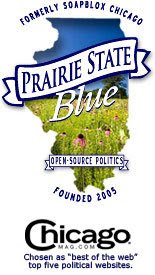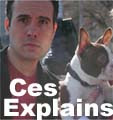Total number of books I've owned:
Many.
Very many.
So many that it was -- once again -- the subject of conflict in my household. There were about 1,000 books in our library, but then I brought six boxes of books in from our garage on Saturday.
My wife informed me that my compulsion to own all the books in the world is "not normal." Of course this is true, but I do not hold "normal" in particularly high esteem.
Nevertheless, by marshaling the facts, e.g. I have six paperback copies of Neuromancer, and once again besting me rhetorically, my bride -- a voracious reader herself -- forced me to face the unpleasant facts that:
- there is a limited amount of surface area in our home,
- a minimum amount of a home's surface area must remain open for a family to live in the manner in which citizens of a first-world nations have become accustomed, and
- the amount of our home's living space remaining unsurrendered to the printed page is rapidly approaching to the point where books are no longer a civilizing factor.
Of course, that doesn't include the scores of my books stored at my parents' home...
or the dozens at my brother's apartment...
or the books stacked up at work...
or the one's I've lent out.
Okay... maybe I have a problem.
The last book I bought:
The Affluent Society by John Kenneth Galbraith (1958)
I am half-way through The Affluent Society and have nearly exhausted a pen underlining brilliantly worded insights.
One of Galbraith's central ideas is that economists and Americans in general had misinterpreted the centrality of increased production as a function of the value of the items actually produced. Galbraith contended that production was important, not for gadgets, but for jobs.
When men are unemployed, society does not miss the goods they do not produce. *** But the men who are without work do miss the income they no longer earn. *** It is for reasons of economic security that we must produce at capacity.Failure to learn Galbraith's lesson about the purpose of increased production is the source of many of post-NAFTA America's problems. While the supply of cheap gadgets is at an all-time high, the unavailability of secure jobs that pay more than Wal-mart wages is a constant source of instability and a drag on the economy.
If The Affluent Society wasn't the last book I purchased, it would be a strong contender for the "Five Books" list below.
HIGHLY RECOMMENDED.
The last book I read:
Courtroom 302 : A Year Behind the Scenes in an American Criminal Courthouse by Steve Bogira (2005)
From the Tribune:
Even to those who work in the criminal justice system -- perhaps especially to them -- Borgia's book is a revelation.Bogira's book, "Courtroom 302", is a meticulously researched examination of the workings of the criminal courts building, the biggest and busiest felony courthouse in the nation. It focuses on the people, particularly the defendants, who moved through this one courtroom over a 12-month period. ***
He argues that, for all the labor of court workers and for all their best intentions, the activity of the courthouse is a daily miscarriage of justice. That's because it doesn't -- and can't -- address what Bogira sees as the root of the U.S. crime problem: poverty. ***
Consider this: Of the 30,000 cases that move through the 32 courtrooms in the building in a given year, only 1 in 100 involves a jury trial. And only one in nine involves any sort of trial at all.
Most defendants -- nearly 90 percent -- plead guilty. They don't confess because of a sudden rush of repentance. They do it because of a deal worked out with the judge and prosecutors, intent on doing everything they can to keep their huge caseloads from growing even larger. In exchange for their plea, the defendants get an easier sentence, often on a lesser charge.
It's the courthouse as a sort of bargain basement -- where judges and prosecutors offer discounts to suspects willing to allow them to clear cases off the books.
That's one of several metaphors Bogira employs to describe life at 26th Street, as the court building is often called. Another is that of a huge factory through which defendants move like so much raw material being sorted, handled and spat out.Still another image, one sometimes used by court personnel, is the building as a kind of garbage disposal system. As one sheriff's deputy says, "We get the dregs of humanity here."
"The guilty plea," Bogira says, "is central to the system working. It allows this factory to keep moving -- which, in turn, allows us to feel we're addressing our crime problems. It's a great enabler."
Bogira's argument is simple: Americans could attack crime by attacking its source -- by working to reduce poverty through jobs, better schools, better housing and better health care. But the U.S. has decided, he contends, that it's cheaper and easier to let crime happen (generally, in low-income neighborhoods) and deal with it in the courts.
HIGHLY RECOMMENDED.
Five books that mean a lot to me:
Cash: The Autobiography by Johnny Cash (1998)
Mother tells the story that when I was a baby the first two word phrase I ever said was, "Johnny Cash." She insists that when Cash's signature boom-chica-boom-chica spilled from our radio, as it frequently did, I would excitedly shout "Johnny Cash! Johnny Cash!"
Sure, mom might be full of crap. But it doesn't really matter.
The point is J.R. Cash was a central figure in my childhood. And even if he never sang a note -- and there is certainly an argument to be made about his "singing" -- he would be a great man to me for penning song "The Man in Black."
On one level, it was written as a simple explanation for his monochromatic choice in clothes, but on a deeper level, it is a vow to daily remember those that are forgotten.
I wear the black for the poor and the beaten down,Cash was also proof that it was possible for someone outside of my family to be a devout, even enthusiastic, Christian without being a friggin' a-hole about it.
Livin' in the hopeless, hungry side of town,
I wear it for the prisoner who has long paid for his crime,
But is there because he's a victim of the times.
I wear the black for those who never read,
Or listened to the words that Jesus said,
About the road to happiness through love and charity,
Why, you'd think He's talking straight to you and me.
Well, we're doin' mighty fine, I do suppose,
In our streak of lightnin' cars and fancy clothes,
But just so we're reminded of the ones who are held back,
Up front there ought'a be a Man In Black.
And Cash was also a total bad-ass. And a consummate family man. At the same time.
I never met him. I never even saw him in concert -- by the time I could afford tickets, illness kept him from touring -- but he was a constant presence in our house and he remains a hero to me to this day. His signed autobiography is one of the two books I would grab in case of fire.
Power Game: How Washington Works by Hedrick Smith (1988)
I read this during Poli-Sci 101.
When I entered the class, I didn't know I was smart enough to understand all the intricate details of Washington politics. As a result, like too many people, I voted based on the images constructed and projected by the parties. When I left the class, I realized that I possessed the intellectual tools necessary to identify the political party that actually acted in accord with my values and to vote as an intelligent citizen.
Not coincidentally, although I entered the class as a registered Republican, I exited the class as a registered Democrat.
Dreams from My Father: A Story of Race and Inheritance by Barack Obama (1997)
This book and its author spurred me to take an active part in politics.
One day Obama will be the nation's first black president and we will all be better for it.
Obama's signed autobiography is the other book I would try to rescue from a fire.
Neuromancer by William Gibson (1984)
"The sky above then port was the color of television, tuned to a dead channel."
Gibson's sci-fi classic was my introduction to the cyberpunk genre.
When one considers that "Austin Mayor" is a purely fictional entity who exists only online, one begins to appreciate the impact that Gibson's works have had on my brain and how much the world has come to mirror his imagination.
But nothing explains owning six copies.
E-mail me if you want one.
Origins of Marvel Comics by Stan Lee, Jack Kirby and Steve Ditko (1974)
"With great power comes great responsibility."
Heroes are liberal. Liberals are heroic. 'Nuff said.
Tag five people and have them fill this out on their blogs:
Of course this operates on the presumption, perhaps unfounded, that the following bloggers bother to read this blog. But I guess I'll risk it, call out the Blogginois big dogs, and tag Eric, Rich,
update: I didn't pick OneMan, one of my other favorite Republicans, earlier because I didn't notice that Ralph had already participated in this bit of net fluff.
Well, that and the fact that I wanted my list to lean center-left.













No comments:
Post a Comment